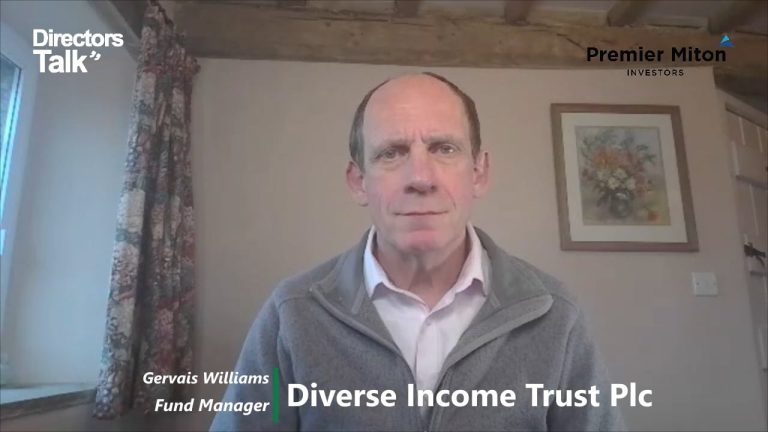Diverse Income Trust Plc (LON:DIVI) Fund Manager Gervais Williams caught up with DirectorsTalk for an exclusive interview to discuss the Chancellor’s spring statement, the impact of Trump’s tariff, which sectors will be impacted by those tariffs, and the opportunities for UK equities.
Q1: Gervais, I’d very much like to get your views on Trump’s new tariffs and the various market potential impacts but before we get into that, Chancellor Rachel Reeves gave her spring statement on the 26th of March. Now, you’re a huge advocate for UK capital for UK jobs, are you seeing any evidence of the government encouraging UK-based investment in domestic firms? And more generally, was the Chancellor’s recent spring statement a help or a hindrance to UK companies, especially smaller firms that rely on domestic growth?
A1: Yes, it was interesting. In a way, the statement was fairly plain vanilla, it was addressing the shortfall in terms of the current budget and in a way, that’s important, because although she has fiscal rules, it’s not so much about what her fiscal rules are, it’s about what international investors think. The important thing was that investors listened to what she said, and bond yields, UK bond yields, are much in line with many others.
From my point of view, that’s the key outcome of her statement. She’s retained international credibility; the UK is a good place for investing and that’s the outcome we’ve seen. We haven’t really seen that much conversation about what they intend to do regarding renewed interest in the UK market, the UK stock market, but that’s to come in future.
Q2: Just turning to the global economy. How do you see the recent US tariffs affecting the global economy, and do you believe they could trigger a broader slowdown or stagflation?
A2: I think the key about these changes is that the range of outcomes in terms of stock markets and global economy is extremely wide ranging now. Before we had a conversation about, are we going to have this much growth or that much growth, is inflation a little bit higher or a little bit lower than we expected? The range of outcomes is relatively narrow.
I think with the trade tariffs introduced by President Trump; I think the range of outcomes is extremely wide. So we must be, first of all, a little bit careful about being too certain about what’s coming but the major impact is, of course, that the wide range of uncertainty now means that people are going to change behaviour.
Governments, international governments, in their relations with the US are going to trade, they’re going to try and find solutions, but they’re also going to be more careful themselves. Much more importantly, consumers, companies themselves, are also going to be much more careful. Market liquidity has come down quite sharply as a result of these announcements, that means that companies which are more vulnerable, those which are more highly borrowed, those which are making losses, are more vulnerable.
So, I think to summarise overall, we’re looking at a much more nuanced period where the weak may fail and hopefully the strong will not just succeed but hopefully have more opportunity to expand as the weak fail.
Q3: Which sectors or types of companies do you think will be most impacted by those tariffs, both in the US and UK markets?
A3: The tariffs really principally affect companies which are in the trading goods sector, these are buying and selling imports and exports and that’s the area which most people are talking about as being heavily affected. It will affect many of these companies but actually, I think it will affect much more of the global economy than that. Because, whilst you may have tariff barriers on our trading goods, I think you may actually start to find that companies and countries start to introduce certain sort of fiscal barriers. So, we’re not going to export this much or we’re not going to buy these services from this country and so I think actually it’s a much more wide-ranging feature.
The area I’m probably more worried about isn’t just the trade and goods sector, but actually many of the services sectors. Many of these companies which are producing the services like legal services, accountancy services, etc., I think we’re going to see margins in these areas become much harder because companies just won’t be able to afford the kinds of levels of costs they’ve tolerated in the past. I think that’s going to lead to profit margin pressure across service sectors almost as much as we see it in the trade and goods sector.
So, I think quite a wide-ranging impact really, not just the trade and goods, as you might imagine.
Q4: Now, with increasing volatility in US tech stocks, do you see this as an opportunity for UK equities, particularly small and big up stocks?
A4: Many of the US technology stocks are mega caps, they’re the very largest companies in the world and of course, if we do get behaviour changes where people start to put taxes on some of the US technology companies or some kind of change which stops some trading as well, then effectively, when you’re a global company, there’s very little you can do about it. There’s nowhere else you can make up for those lost sales.
So, I think that the mega caps, not just US mega caps, mega caps generally are particularly vulnerable in this period of protectionism and so I think that’s really quite a negative for the largest quoted companies.
The companies which are less badly affected are those which are generating surplus cash. If there is a liquidity shortfall in the markets, if markets are unsettled, then you could find that many of these companies which generate surplus cash are able to expand into markets which being vacated by those which fail. If we do find potentially that perfectly viable companies, but over indebted for into receivership, then you can often buy those from the receiver debt free for as little as £1 or $1. So, I think there’s earnings opportunity to accelerate in some of the equity income stocks.
I think that probably the most exciting area is going to be the small cap area. As you know, small caps have been very much lost out during the period of the mega cap outperformance, the valuations are low. So, those kinds of companies can often grow even when the world’s not growing and when they do deals like buying assets from the receiver, sometimes the earnings upgrades can be not just strong, but actually transformational in terms of earnings growth. I think as we move away from the mega cap struggling a bit and as we move towards small caps accelerating earnings growth, I think as capital starts to flow alongside that, you’re going to find even smaller amounts of capital coming into small caps drive very considerable outperformance of small caps.
I am more bullish now than I’ve been for 30 years about the outperformance of small caps from here.
The Diverse Income Trust (LON:DIVI) focuses on UK-listed companies across the market cap spectrum, with a long-term tilt toward small and mid-sized firms that generate resilient cash flows.










































